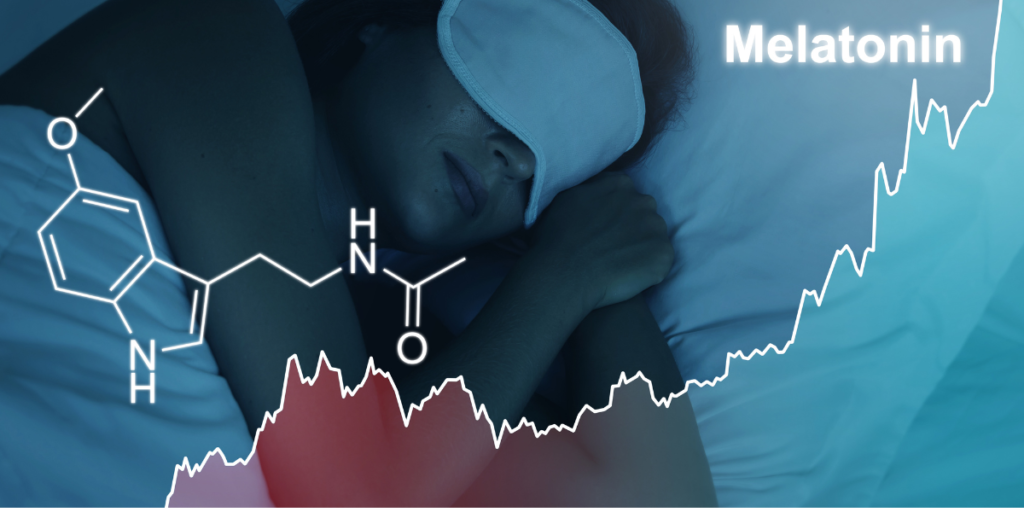Melatonin: The Natural Sleep Hormone for Restful Nights

Melatonin is a naturally occurring hormone produced by the pineal gland, a small endocrine gland located deep in the brain. Its primary function is to regulate the body’s sleep-wake cycle by responding to changes in light exposure. As darkness falls, melatonin production increases, signaling to the body that it is time to relax and prepare for sleep. This process helps induce drowsiness and lower body temperature, promoting a restful night’s sleep. Conversely, as morning approaches and light exposure increases, melatonin levels gradually decline, helping the body wake up and stay alert throughout the day. This rhythmic fluctuation of melatonin plays a crucial role in maintaining a stable circadian rhythm, which influences not only sleep patterns but also various biological processes, including metabolism, immune function, and mood regulation.
How Does Melatonin Work?

The body naturally increases melatonin production in low-light conditions, helping to induce drowsiness and signal the transition into sleep. This process is part of the circadian rhythm, which aligns with the natural day-night cycle. However, exposure to artificial light, particularly the blue light emitted from electronic screens like smartphones, tablets, and computers, can significantly suppress melatonin production. This disruption can make it more challenging to fall asleep and maintain restful sleep throughout the night. Additionally, several factors influence natural melatonin levels, including age, as production tends to decline with aging, leading to sleep disturbances in older adults. Diet also plays a role, with certain foods like cherries, nuts, and dairy containing compounds that support melatonin synthesis. Stress and irregular sleep habits can further impact melatonin regulation, potentially leading to insomnia or poor sleep quality. Maintaining healthy sleep hygiene and minimizing blue light exposure before bedtime can help support the body’s natural melatonin production and improve overall sleep health.
Benefits of Melatonin for Sleep Health

Melatonin plays a vital role in regulating the body’s circadian rhythm, often referred to as the internal body clock. By synchronizing sleep-wake cycles with the natural light-dark cycle, it helps maintain a consistent and healthy sleep pattern. One of its key benefits is improving sleep onset, making it easier to fall asleep, while also reducing nighttime awakenings to promote deeper, more restorative rest. This makes melatonin particularly useful for individuals struggling with sleep disorders such as insomnia. Additionally, it is highly beneficial for those experiencing jet lag or adapting to shift work, as it helps reset the body’s clock and align it with new sleep schedules. Beyond sleep, melatonin has been found to support mental well-being by alleviating symptoms of anxiety and seasonal affective disorder (SAD), conditions often linked to disrupted sleep and irregular light exposure. Its natural, non-habit-forming properties make it a widely used supplement for improving overall sleep quality and well-being.
Natural Ways to Boost Melatonin Production

To naturally support melatonin production and improve sleep quality, it’s essential to establish healthy sleep habits. Maintaining a consistent sleep schedule by going to bed and waking up at the same time each day helps regulate the body’s internal clock, making it easier to fall asleep and wake up refreshed. Reducing blue light exposure before bed is also crucial, as the blue wavelengths emitted from screens and electronic devices can suppress melatonin production, delaying sleep onset. Incorporating melatonin-rich foods into your diet, such as cherries, nuts, and bananas, can naturally support the body’s sleep-wake cycle. Additionally, creating a dark, relaxing bedroom environment by dimming lights, using blackout curtains, and minimizing noise can signal to the brain that it’s time to wind down.
On the other hand, certain habits can disrupt melatonin production and make it harder to sleep. Using screens late at night without blue light filters can interfere with the body’s natural sleep signals, making it difficult to fall asleep. Consuming caffeine and alcohol before bed can also negatively impact sleep quality—caffeine stimulates the nervous system, keeping you alert, while alcohol can disrupt deep sleep stages. Sleeping in a room with bright lights can suppress melatonin release, preventing the body from entering a restful state. By adopting these sleep-friendly practices and avoiding common disruptions, you can naturally enhance melatonin production and improve overall sleep health.
Melatonin Supplements – Are They Right for You?

Melatonin supplements are widely used to support sleep health and can be particularly beneficial for individuals struggling with insomnia, jet lag, and other sleep disorders. By mimicking the body’s natural melatonin production, these supplements help regulate the sleep-wake cycle, making it easier to fall asleep and stay asleep. They are available in various dosages and forms, including pills, gummies, and liquid drops, allowing users to choose an option that best suits their needs. For optimal effectiveness, melatonin is best taken 30 to 60 minutes before bedtime, as this allows enough time for the hormone to signal the body to prepare for sleep. However, while melatonin is generally considered safe for short-term use, it is always recommended to consult a healthcare professional before starting, especially for individuals with existing medical conditions, those taking medications, or those considering melatonin for children. Proper dosage and timing are key to maximizing its benefits while minimizing potential side effects.
FAQs: Common Questions About Melatonin
Is melatonin safe?
✔️ Yes, when used appropriately. However, consult a doctor for long-term use.
How much melatonin should I take?
✔️ Typical doses range from 0.5mg to 5mg. Start with a low dose and adjust as needed.
Can melatonin help with anxiety?
✔️ It may help by promoting relaxation, but it’s not a primary treatment for anxiety.
Does melatonin have side effects?
✔️ Possible side effects include grogginess, dizziness, and vivid dreams in some users.
Can kids take melatonin?
✔️ Only under medical supervision.